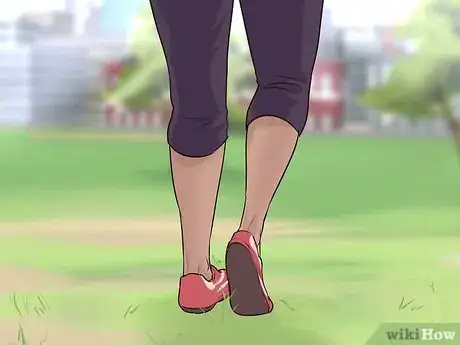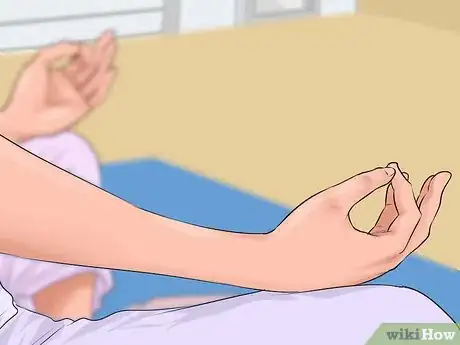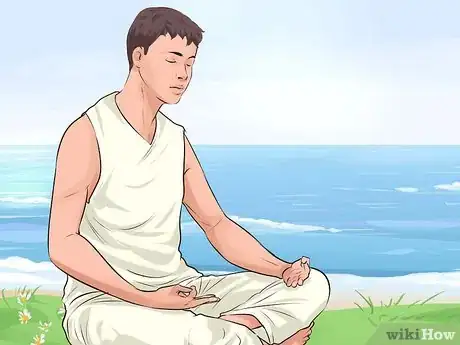This article was co-authored by Jennifer Butler, MSW. Jennifer Butler is a Love & Transformation Coach and the Owner of JennJoyCoaching, a life coaching business based in Miami, Florida, although Jennifer works with clients all over the world. Jennifer’s work centers around empowering women who are navigating any stage of the divorce or breakup process. She has over four years of life coaching experience. She is also the co-host of the Deep Chats Podcast along with Leah Morris and the host of season 2 “Divorce and Other Things You Can Handle” by Worthy. Her work has been featured in ESME, DivorceForce, and Divorced Girl Smiling. She received her Masters of Social Work (MSW) from New York University. She is also a Certified Health Coach, a Communications & Life Mastery Specialist, and a Certified Conscious Uncoupling and Calling in “the One” coach.
There are 15 references cited in this article, which can be found at the bottom of the page.
wikiHow marks an article as reader-approved once it receives enough positive feedback. In this case, several readers have written to tell us that this article was helpful to them, earning it our reader-approved status.
This article has been viewed 57,276 times.
Many people can’t stand spending time alone. However, in order to truly enjoy someone else’s company, you must first be able to cherish your own. If you give solitude a chance, you may find that you can be very constructive during your alone time. Plus, if you make the most of time spent solo, you may be more attentive, relaxed, or positive when you are spending time with others. Learn how to enjoy solitude by using this time for emotional and creative stimulation, for reflection, or to catch up on projects.
Steps
Learning to Like Solitude
-
1See the benefit of solitude. Many people equate solitude with loneliness. They are not the same. Loneliness is subjected to you by other people. It can make you feel sad or miserable.[1] Solitude, on the other hand, can be a time of rejuvenation and exploring the self.[2] Here are just a few benefits of spending time alone:[3]
- Your brain has a break to rest and reboot.
- You are more capable of being productive.
- You learn more about yourself during moments of solitude.
- You have a better opportunity to problem-solve and weigh your options.
- You have an improved perception of yourself and therefore choose more healthy relationships.
-
2Increase the amount of time you spend alone gradually.[4] Take baby steps. If you are a person who tends to think solitude is boring or uncomfortable, it may not do well to force yourself into long bouts of solitude. In this case, it's better to slowly increase the amount of time you spend alone. [5]
- If you are always surrounded by others, simply schedule in about 30 minutes of solitude each day for a week. You might choose to drive or walk to work on your own instead of joining someone else. You might go for a hike alone or visit the beach on your own. Just commit to doing a short, 30-minute activity without anyone else present or demanding your attention.
- Take notes on the experience. Was it better than you anticipated? Were you bored? Why? Write down as many details as possible to better understand your aversion to being alone.
Advertisement -
3Prepare wisely for moments of solitude. Just because you find solitude boring doesn't mean it has to be. If you have periods of alone time approaching, make plans so that your solitude is filled with interesting and fulfilling activities.
- For example, if you have to stay home on your own for a weekend, you could rent some cool movies, plan to do a creative project, or complete schoolwork during your alone time. To keep your energy revved, gather fun music, books, and other tools to make the time less boring.
- Preparing for moments of solitude can make the difference between the time dragging by and going by more quickly. Simply fill the hours with things you already love to do.
Stimulating Emotional Well-Being and Creativity
-
1Develop a passion for art. Because creativity flourishes during moments of solitude, you may benefit from selectively choosing periods to boost this aspect of yourself. When you are not distracted by the demands of others on your time, your mind opens up to greater possibilities.[6]
- Being alone is a great time to brainstorm a new business idea, write a novel, develop a new song, make pottery, improve your photography skills, and so on. Even if you do not work in an obvious creative field, you can still benefit from this creativity boost.
-
2Engage in a hobby. Although you can pursue passions and interests with others, you can also have fun pursuing them alone. Whatever it is that makes you feel relaxed and happy, do it by yourself. This brings with it the added value of allowing you to relax and de-stress on your own. You can also do things that maybe your friends or partner are not interested in or do not have time to join in on.
- Solo activities cover the full spectrum of hobbies. You can go for a hike, read a book, visit a museum, or shop at a flea market.[7]
-
3Play with a furry friend. Just because you’re not spending time with any humans doesn’t mean you can’t enjoy time with an animal companion. Caring for pets can help you overcome a multitude of ills, such as loneliness, depression or anxiety. Pets influence us to go outdoors, they provide companionship without requiring conversation, and they help us make healthier decisions.[8]
-
4Perform self-care activities. Alone time is a perfect opportunity to do activities that are nurturing and soothing to your mind, body, and soul. Many people neglect self-care because they are so busy with other obligations. However, tending to your mental and emotional well-being can allow you to perform better, concentrate better, and even fight stress in your daily life--no matter what your career involves.
- Self-care activities can be anything you enjoy doing that restores you. It could be meditating in the mornings before starting your daily routine. It could be relaxing in a hot bath after a long day of work.
- Choose a few activities that you find soothing and do them during your alone time each week. You might find, after doing this for a few days/weeks, that you have actually come to like solitude!
Using Time Alone to Reflect
-
1Be grateful for the life you have. A great way to use your solitude constructively is to start a gratitude journal. Being grateful allows you to appreciate what you already have instead of fretting over what you don’t. Gratitude promotes positive thinking and can even lift your mood.[9]
- Spend a few minutes of your solitude jotting down a couple of things/people/opportunities you have to be thankful for. They can be a simple as having a bed to sleep in or a moment to yourself.
-
2Set realistic goals and develop a plan to accomplish them. Your alone time can be a perfect opportunity to reflect on your personal development. Use this time to consider your personal or career goals and how far along you are in reaching them. If you don’t have any concrete goals, now’s the time to spell them out and create an action plan.
- Since solitude boosts concentration and productivity, this a wonderful time to plan out your goals and figure out a method for reaching them. Just be sure to develop SMART goals. These are goals that are specific, measurable, attainable, realistic, and time-dependent.[10]
- Get a notebook and jot down some major goals and add in actions you can take to accomplish them. If you have really large goals, you may need to create smaller goals to move towards before reaching the primary one. For example, if you would like to move to Spain, you might have smaller goals like saving money, finding a job, and learning Spanish.
-
3Journal about your thoughts and behaviors. Journaling is a great tool for self-reflection. Taking some of your alone time to write down how your day went can help you unload stress, spot patterns in your thoughts and behaviors, and come up with solutions to problems. As a result, you will have enhanced your mental health and well-being and feel more confident about going through hardships.[11]
-
4Carry out spiritual practices. Solitude can also help you develop your own sense of spirituality. Whether that translates to following religious principles or discovering your true purpose in life, you will have the ability to think more clearly and deeply when alone.
- Spirituality will mean different things to different people, but it tends to refer to a connectedness with one’s inner self—a process that can only be achieved when alone. Use this time to meditate, practice yoga, pray, or reflect in nature for great spiritual understanding.[12]
Catching Up on Lost Time
-
1Exercise in your free time. Regular physical activity is important for good health and longevity. Plus, engaging in exercise releases “feel-good” chemicals into the brain called endorphins, helping to lift your mood and clear your thinking. If you have a moment of alone time to spare, get your body moving.
- In addition to boosting your mood, exercise also enhances energy, fights disease, improves sleep quality, and helps you manage weight. Go for a walk/run with your dog. Hike through the local woods. Ride your bike to the farmer’s market on weekends.[13]
-
2Take a nap. Sometimes, you may be so over-engaged with those around you that you do not allow yourself time to properly rest. Napping too late in the day can interfere with your nighttime rest, but as long as you time it right, your nap can provide much needed energy and restoration.
- Just keep your naps to a short period of time (say, 20-30 minutes) and several hours before you were planning to go to bed at night.[14]
-
3Complete chores and errands. When you’re not surrounded by family or friends, you may get a special opportunity to catch up on chores that need completing. If you are faced with long bouts of solitude, make a list of projects you have wanted to get done, and start moving through the list.[15] This will make your periods of solitude productive and also help the time go by faster.
-
4Do nothing. Truth is, some people schedule activities and events for nearly every second of every day. This pursuit of “busyness” can make it seem as if you are being productive when, in reality, you are not. Some people believe downtime is a sign of weakness or not trying hard enough, so they aim to stay busy.
- Be mindful that downtime can be incredibly positive when it is used for self-soothing and restoring activities. However, if you are using your downtime for mindless activities or distractions, you could be adding to your stress rather than relieving it.
- Assess the things you do during alone time and see if they have a positive benefit or are simply distractions until you are around others again.[16]
Expert Q&A
-
QuestionCan solitude be a good thing?
 Jennifer Butler, MSWJennifer Butler is a Love & Transformation Coach and the Owner of JennJoyCoaching, a life coaching business based in Miami, Florida, although Jennifer works with clients all over the world. Jennifer’s work centers around empowering women who are navigating any stage of the divorce or breakup process. She has over four years of life coaching experience. She is also the co-host of the Deep Chats Podcast along with Leah Morris and the host of season 2 “Divorce and Other Things You Can Handle” by Worthy. Her work has been featured in ESME, DivorceForce, and Divorced Girl Smiling. She received her Masters of Social Work (MSW) from New York University. She is also a Certified Health Coach, a Communications & Life Mastery Specialist, and a Certified Conscious Uncoupling and Calling in “the One” coach.
Jennifer Butler, MSWJennifer Butler is a Love & Transformation Coach and the Owner of JennJoyCoaching, a life coaching business based in Miami, Florida, although Jennifer works with clients all over the world. Jennifer’s work centers around empowering women who are navigating any stage of the divorce or breakup process. She has over four years of life coaching experience. She is also the co-host of the Deep Chats Podcast along with Leah Morris and the host of season 2 “Divorce and Other Things You Can Handle” by Worthy. Her work has been featured in ESME, DivorceForce, and Divorced Girl Smiling. She received her Masters of Social Work (MSW) from New York University. She is also a Certified Health Coach, a Communications & Life Mastery Specialist, and a Certified Conscious Uncoupling and Calling in “the One” coach.
Love & Empowerment Coach Learning how to be alone can actually make you a better partner in your relationships.
Learning how to be alone can actually make you a better partner in your relationships. -
QuestionWhat does it mean to be in solitude?
 Trudi Griffin, LPC, MSTrudi Griffin is a Licensed Professional Counselor in Wisconsin specializing in Addictions and Mental Health. She provides therapy to people who struggle with addictions, mental health, and trauma in community health settings and private practice. She received her MS in Clinical Mental Health Counseling from Marquette University in 2011.
Trudi Griffin, LPC, MSTrudi Griffin is a Licensed Professional Counselor in Wisconsin specializing in Addictions and Mental Health. She provides therapy to people who struggle with addictions, mental health, and trauma in community health settings and private practice. She received her MS in Clinical Mental Health Counseling from Marquette University in 2011.
Professional Counselor Solitude is getting away from other people and/or your normal life routine. Often, people choose solitude to gain a new perspective on life and recently.
Solitude is getting away from other people and/or your normal life routine. Often, people choose solitude to gain a new perspective on life and recently. -
QuestionHow can you be happy alone?
 Trudi Griffin, LPC, MSTrudi Griffin is a Licensed Professional Counselor in Wisconsin specializing in Addictions and Mental Health. She provides therapy to people who struggle with addictions, mental health, and trauma in community health settings and private practice. She received her MS in Clinical Mental Health Counseling from Marquette University in 2011.
Trudi Griffin, LPC, MSTrudi Griffin is a Licensed Professional Counselor in Wisconsin specializing in Addictions and Mental Health. She provides therapy to people who struggle with addictions, mental health, and trauma in community health settings and private practice. She received her MS in Clinical Mental Health Counseling from Marquette University in 2011.
Professional Counselor Do things you enjoy and that bring you contentment. For instance, if you love to read or knit, spend time alone reading and knitting.
Do things you enjoy and that bring you contentment. For instance, if you love to read or knit, spend time alone reading and knitting.
References
- ↑ https://www.psychologytoday.com/articles/200307/what-is-solitude
- ↑ Jennifer Butler, MSW. Love & Empowerment Coach. Expert Interview. 2 September 2020.
- ↑ https://www.psychologytoday.com/blog/high-octane-women/201201/6-reasons-you-should-spend-more-time-alone
- ↑ Jennifer Butler, MSW. Love & Empowerment Coach. Expert Interview. 2 September 2020.
- ↑ http://www.becomingminimalist.com/solitude-where-your-life-is-waiting/
- ↑ http://zenhabits.net/creative-habit/
- ↑ http://www.huffingtonpost.com/2013/01/11/being-alone-6-reasons-to-_n_2456462.html?slideshow=true#gallery/274198/4
- ↑ http://www.helpguide.org/articles/emotional-health/the-health-benefits-of-pets.htm
- ↑ http://www.happify.com/hd/the-science-behind-gratitude/
- ↑ http://topachievement.com/smart.html
- ↑ http://psychcentral.com/lib/the-health-benefits-of-journaling/
- ↑ http://psychcentral.com/blog/archives/2014/06/19/3-ways-to-develop-a-spiritual-practice/
- ↑ http://www.mayoclinic.org/healthy-lifestyle/fitness/in-depth/exercise/art-20048389
- ↑ https://sleepfoundation.org/sleep-topics/napping
- ↑ https://www.scotthyoung.com/blog/2007/07/30/15-tips-for-enjoying-solitude/
- ↑ http://tinybuddha.com/blog/why-we-stay-busy-when-were-not-benefits-doing-nothing/
About This Article
To enjoy solitude, find some fun activities that you can do alone, like writing, painting, or playing an instrument. You can also use this time to practice some self-care, like relaxing in a hot bath or meditating before the start of a busy day. Additionally, spend your alone time catching up on errands or exercising to keep yourself busy and productive. If spending time alone is uncomfortable for you, gradually build more solitude into your life by scheduling 30 minutes of alone time each day. To learn how to prepare yourself for unexpected moments of solitude, keep reading!













































































